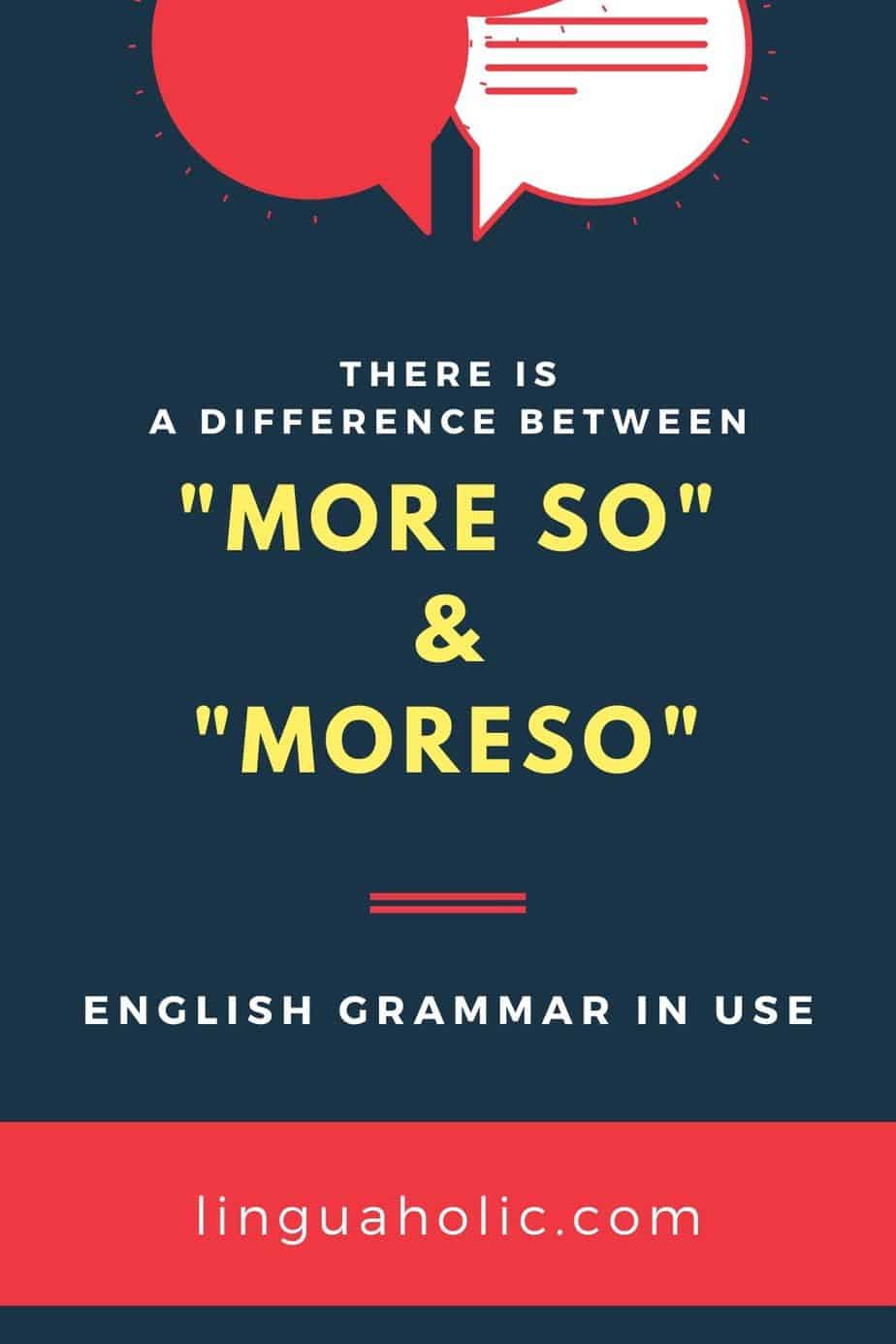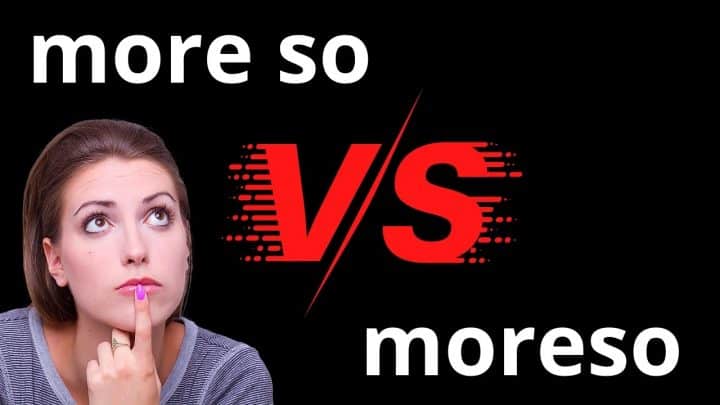Which is a better choice, “more so” or “moreso”? Is the latter variant incorrect?
For some reason, humans break the “rules” to achieve some sense of language convenience.
This has been the case with “moreso,” the non-standard variant of “more so” which is used to either intensify or recall ideas in sentences.
Now, without much more to say, let’s get started!
Which is correct, “more so” or “moreso”?
To date, the two-word version remains widely-recognized as the standard and preferred version by native English-speaking countries and language authorities. Meanwhile, “moreso” is chiefly acknowledged online as a non-standard variant, which is likely used because it does not prompt pressing obscurity.
In a nutshell, we can say that it be would wiser to use “more so” if we do not want to attract any form of unintentional misjudgment from English grammar purists.
The differences between “more so” and “more so”
“More so” or “moreso” is an anaphoric device that enables the writer to create non-redundant sentences.
In stylistics, an anaphora is a strategic figure of speech used to rhetorically repeat word sequences, or simply to create emphasis.
Emphasizing ideas in writing is crucial in transferring the implication of the message across the audience, particularly in the absence of verbal articulation.
The book In Defence of Plain English by Victoria Branden mentions that the perfunctory teaching practices and the half-heard nature of the standard phrase gave birth to the single-word variant.
Another source, the Grammarist, explains that “more so” is used to imply the meaning “to a higher degree” wherein “so” anaphorically recalls an earlier adverb or adjective.
Furthermore, the Merriam-Webster rather lists the more complete version of the phrase as an idiomatic expression as (all) the more so.
Let us look at some examples as to how each can be used in sentences.

Examples of “more so” in a sentence
To reiterate an earlier point, “more so” is generally used to express the idea of having a higher extent or degree and to recall a previously-mentioned word.
As an anaphoric tool, its job is mainly to avoid using adverbs or adjectives redundantly.
Many think that Keila is hilarious, but I believe her older brother is more so.
The sentence above subjectively compares the two people in the sentence, Keila and her brother.
Although a lot of people recognize the idea that Keila is funny, the second clause implies that her brother is more of a comedic genius, when compared to Keila.
As stated in the Merriam-Webster online dictionary, (all) the more so is an idiomatic expression, which should be the more complete version of “more so.”
To give an example of the idiomatic meaning of the unellipted version, let us also look at the next example.
She is such a resilient lady, all the more so because she’s been single-handedly raising her three kids after her husband died in the collision they were both in.
The idea of intensifying and justifying the implication of the first clause remains true in the above scenario.
Nevertheless, to present the least ambiguous usage of “more so,” let me end this section with its simplest and least baffling function.
Dad: You’ve been asking for money quite frequently, John, and I’m already worried about you. However, I’ll give you some more (money) so you won’t be bothering others. And, please consider this as your last.
In the example above, “more” acts as a determiner to an omissible noun followed by the conjunctive use of “so” that connects a dependent clause.
This type of usage is the least controversial one and should less likely attract any form of grammatical criticisms, at least in colloquial English.
Examples of “moreso” in a sentence
To present the concrete application of the expression, this section lists a couple of examples as to how authors use “moreso” in their written work.
The Grammarist blog further states that the one-word variation is acceptable in the absence of an antecedent, a previously-referred expression.
Here’s an example in which the claim is supported.
“In a world which is appreciated in nature moreso than spirit, the greatest covenant is that when people entangle in attraction.”
The next example uses the similar function of the idiomatic meaning acknowledged by the Merriam-Webster dictionary.
“Its inherent characteristics make watersports especially risky, moreso where untrained individuals are tempted to ‘take the water’.”
In this case, “moreso” introduces a parenthetical statement, which does not essentially adhere to strict syntactic rules but is rather used for rhetoric reasons.
In the two examples, we can observe that the use of the one-word variant is more likely propelled by stylistic rather than syntactic reasons.
That is, writers would lean more toward using “moreso” to achieve a particular emphatic effect.
Whereas, the standardized version is likely used when the intention is to adhere to syntactical rules.
Is “moreso” grammatically incorrect?
Considering the point wherein most English language authorities do not recognize “moreso” as an official word, then it is much safer to avoid it.
However, it is also wise to bear in mind that sooner or later, it could either be included or excluded from our linguistic repertoire.
This implies that more English language users would tend to think of its usage as “ungrammatical” even if it appears in some written accounts.
The same is true with the term agreeance which is the obsolete and non-standard form of “agreement.”
In fact, people would also cringe if this word is used in everyday speech, and in worse cases, consider the usage as pretentious or a byproduct of language deterioration.
Additionally, Google Ngram viewer has recorded the highest frequency of the usage of “moreso” in 1989, but the number has been dropping by far.
In contrast, the usage of “more so” has been steadily increasing since the beginning of the 1990s, which implies that more language users prefer this over the other variant.
One more important idea to note, though, is the unnecessary or superfluous use of “moreso” in writing, which, obviously enough, should be avoided.
The superfluous “moreso”
By this point, it should already be clear that stylistic reasons drive the use of “moreso,” while syntactical adherence guides the use of the standard form.
However, it is also vital that we know when “moreso” becomes inessential and should be reworded instead.
The next examples are quoted from the book In Defiance of Plain English: The Decline and Fall of Literacy in Canada by Victoria Branden.
“Newfoundlanders need the money much moreso than Ontario workers.”
“The ranges [of examination results] here are much concentrated moreso.”
In the first example, “much more than” should have been the grammatically-correct choice as the sentence only necessitates adverbial comparison.
Meanwhile, the second example should have been stated either as “much more concentrated,” or simply “more concentrated” to make it less ambiguous and superfluous nonetheless.
Deciding between “more so” and “moreso”
In a nutshell, a writer could make a wiser choice by using the standard form “more so” rather than “moreso” in modern times.
In particular, this is because of the latter being unfavored by the general public, which may eventually become obsolete based on the decline of its use in the last three decades.
Also, another notable reason is that the advent of technology has provided free online grammar-checker tools prompting the prohibition of using “moreso.”
This, therefore, implies that if people become even more dependent on automation devices in the near future, then “moreso” will become obsolete sooner.
Conclusion
No matter what, language is a living organism that thrives with civilization, hence the birth and death of words.
This is simply what happened to the expressions discussed in this post, particularly with the non-standard variant “moreso.”
I would like to end this article by saying that the arbitrariness of language would always allow users to resourcefully use it as a convenient communication tool.

Hey fellow Linguaholics! It’s me, Marcel. I am the proud owner of linguaholic.com. Languages have always been my passion and I have studied Linguistics, Computational Linguistics and Sinology at the University of Zurich. It is my utmost pleasure to share with all of you guys what I know about languages and linguistics in general.

